Each organization has a general set of rules that applies to the business and its workers. We must understand that, when it comes to, what is business ethics is nothing but a business ethics drives that general set of rules. Organizations frequently intentionally embrace standards of corporate morals, yet in some cases those standards can be forced by regulation.
Depending on what is business type of an organization, the organization’s business ethics can shape the manner in which it’s seen by the world, its colleagues and clients, so it very well may be critical to progress.
In this article, we will take you through business ethics that matters for any business market, along with what it is and why it’s significant, in addition to investigate seven normal kinds of business morals in the business world.
Contents
- 1 What is business ethics?
- 2 What are the business ethics principles?
- 3 Why business ethics is important?
- 4 Types of business ethics:
- 5 Examples of business ethics:
- 6 Elements of business ethics
- 7 Benefits of ethics in business
- 8 Drawbacks of ethics in business
- 9 How to implement good business ethics?
- 10 Monitoring and reporting unethical behavior:
- 11 How to monitor business ethics within an organization?
- 12 Frequently Asked Questions (FAQ’s):
- 13 Conclusion
What is business ethics?
When it comes to knowing what is business ethics, a business ethics also known as business ethics concentrates on fitting business approaches and works on with respect to possibly disputable subjects, including corporate administration, insider exchanging, pay off, separation, corporate social obligation, guardian obligations, and significantly more.
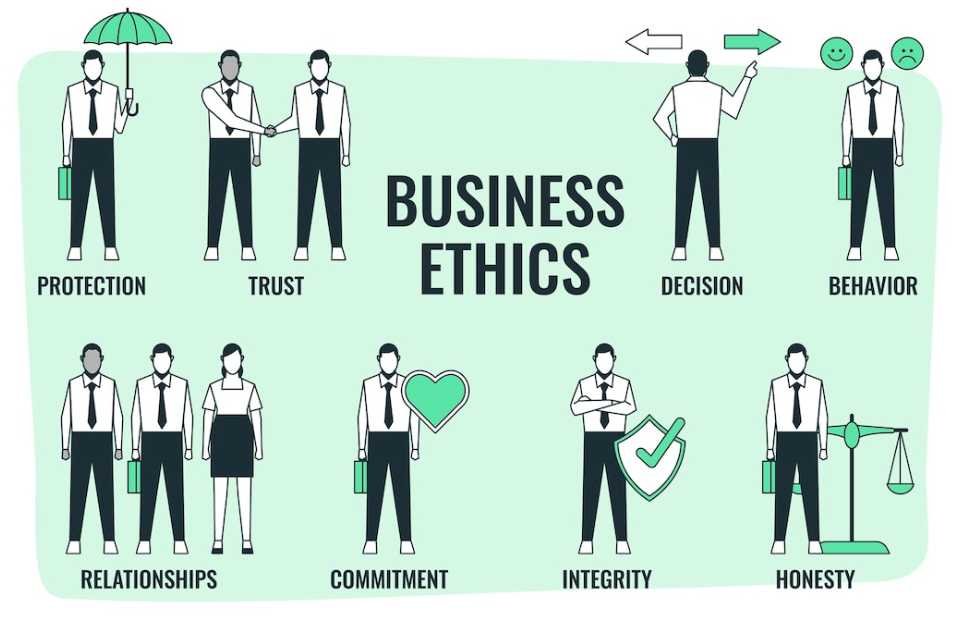
What is business ethics? What factors contributes to business ethics?
The law frequently directs business ethics, however at different times business ethics give an essential rule that organizations can observe to acquire public endorsement.
A business ethics alludes to executing suitable strong business arrangements and practices as to ostensibly questionable subjects.
A few issues that surface in a conversation of morals incorporate corporate administration, insider exchanging, pay off, segregation, social obligation, and trustee obligations. The law generally establishes the vibe for business ethics, giving an essential rule that organizations can decide to observe to acquire public endorsement.
Business morals alludes to the arrangement of moral rules that directs an organization’s lead. These standards oversee each part of the organization’s life, incorporating its collaboration with government and different organizations, its treatment of its workers, and its relationship with its clients.
At the point when any moral predicaments or discussions emerge, a business will look to these essential standards to assist with settling those circumstances.
Understanding what are business ethics?
Business ethics guarantee that a specific fundamental degree of trust exists among buyers and different types of market members with organizations. For instance, a portfolio chief should give similar thought to the arrangement of relatives and little individual financial backers as they do to more well off clients. These sorts of practices guarantee people in general gets fair treatment.
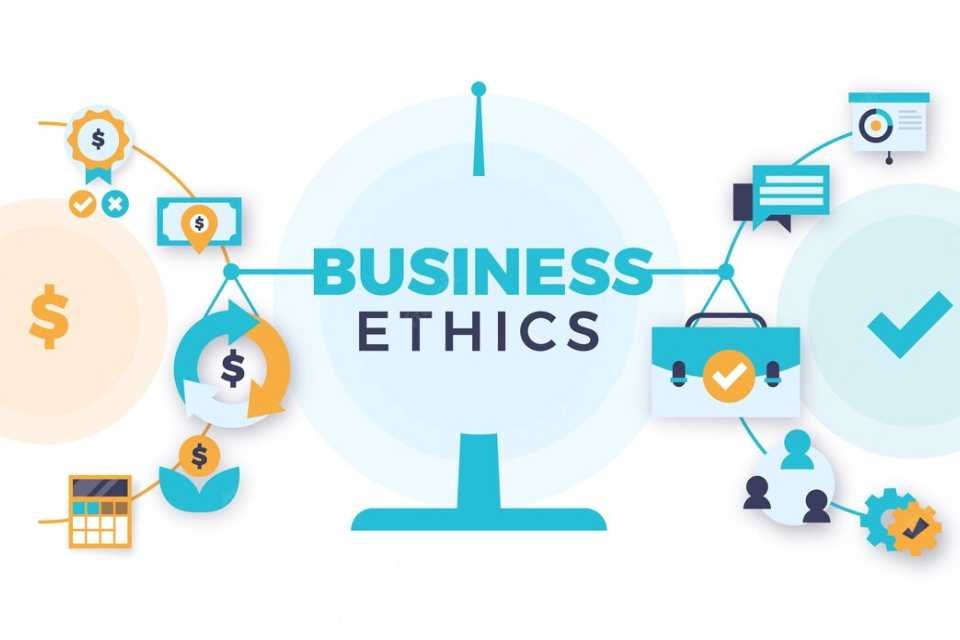
The idea of business ethics started during the 1960s as organizations turned out to be more mindful of a rising purchaser based society that showed concerns in regards to the climate, social causes, and corporate obligation. The expanded spotlight on “social issues” was a sign of the 10 years.
Since that time, the idea of business ethics has developed. business ethics goes past an ethical code of good and bad; it endeavors to accommodate what organizations should do legitimately as opposed to keeping an upper hand over different organizations. Firms show business ethics in more than one way.
Business ethics guarantee a specific degree of trust among shoppers and enterprises, ensuring the public fair and equivalent treatment.
What are the business ethics principles?
It’s fundamental to comprehend the hidden rules that drive wanted moral way of behaving and how an absence of these ethical standards adds to the destruction of numerous generally insightful, gifted individuals and the organizations they address.
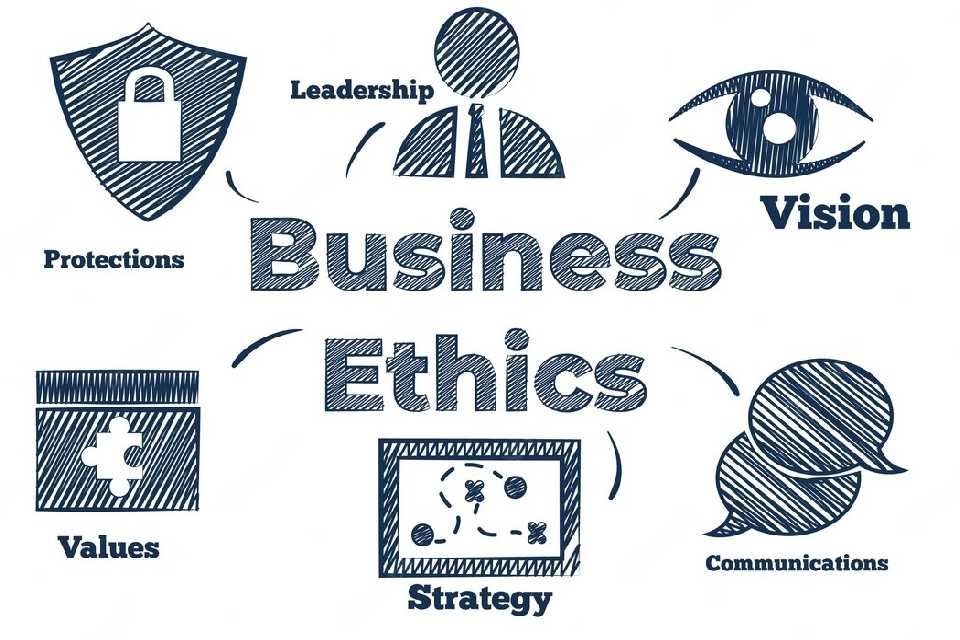
There are by and large 12 business ethics principles:
Principles of business ethics:
1. Leadership:
The cognizant work to embrace, coordinate, and imitate the other 11 standards to direct choices and conduct in all parts of expert and individual life.
2. Accountability:
Considering yourself as well as other people answerable for their activities. Obligation to following moral practices and guaranteeing others adhere to morals rules.
3. Integrity:
Integrates different standards — genuineness, dependability, and unwavering quality. Genuinely honest somebody reliably makes the best choice and endeavors to hold themselves to a better quality.
4. Respect for others:
To cultivate moral way of behaving and conditions in the work environment, regarding others is a basic part. Everybody merits poise, security, balance, opportunity, sympathy, and compassion.
5. Honesty:
Truth in all matters is critical to encouraging a moral environment. Halfway insights, exclusions, and under or exaggerating don’t assist a business with working on its presentation. Terrible news ought to be imparted and gotten in a similar way as uplifting news so arrangements can be created.
6. Respect for laws:
Moral authority ought to incorporate upholding all nearby, state, and government regulations. In the event that there is a lawful ill defined situation, pioneers ought to decide in favor legitimateness as opposed to taking advantage of a hole.
7. Responsibility:
Advance possession inside an association, permit representatives to be liable for their work, and be responsible for yours.
8. Transparency:
Partners are individuals with an interest in a business, for example, investors, workers, the local area a firm works in, and the relatives of the representatives. Without uncovering proprietary advantages, organizations ought to guarantee data about their financial’s, cost changes, employing and terminating practices, wages and compensations, and advancements are accessible to those keen on the business’ prosperity.
9. Compassion:
Representatives, the local area encompassing a business, colleagues, and clients ought to be in every way treated with worry for their prosperity.
10. Fairness:
Everybody ought to have similar open doors and be dealt with something similar. On the off chance that a training or conduct would cause you to feel awkward or place individual or corporate advantage before uniformity, normal graciousness, and regard, it is possible not fair.
11. Loyalty:
Authority ought to show secretly and obligation to their workers and the organization. Rousing dependability in workers and the board guarantees that they are resolved to best practices.
12. Environmental concern:
In our current reality where assets are restricted, biological systems have been harmed by past practices, and the environment is transforming, it is of most extreme significance to know about and worried about the ecological effects a business has. All workers ought to be urged to find and report answers for rehearses that can add to harms previously finished.
Why business ethics is important?
There are a few reasons business ethics are fundamental for outcome in current business. In particular, characterized morals programs lay out an overarching set of rules that drives worker conduct — from chiefs to center administration to the most up to date and most youthful representatives.
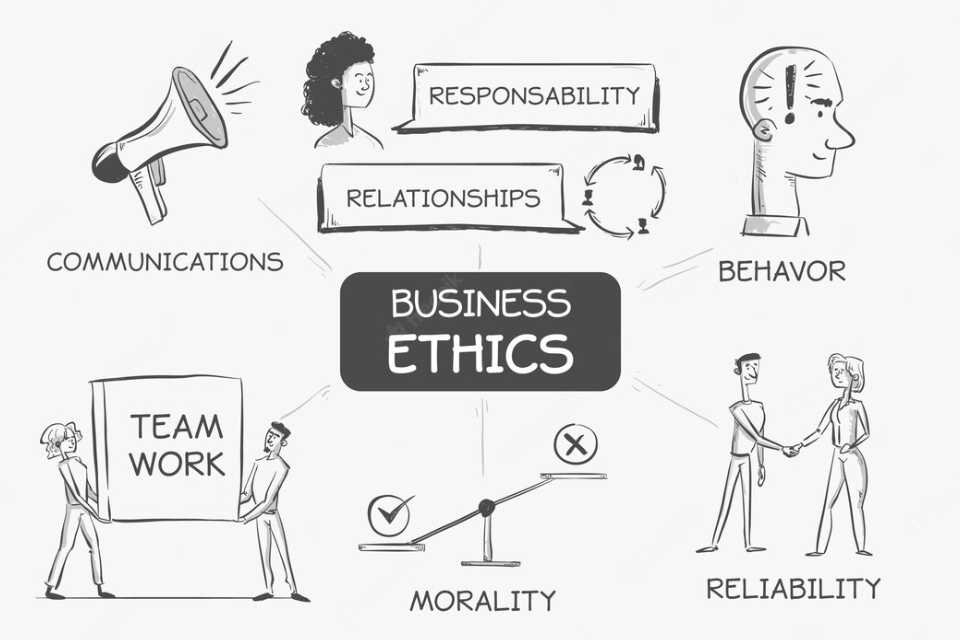
At the point when all representatives go with moral choices, the organization lays out a standing for moral way of behaving. Its standing develops, and it starts to encounter the advantages an ethical foundation harvests:
- Brand recognition and growth
- Increased ability to negotiate
- Increased trust in products and services
- Customer retention and growth
- Attracts talent
- Attracts investors
At the point when consolidated, this multitude of variables influence a business’ incomes. Those that bomb set moral guidelines and authorize them are ill-fated to ultimately wind up close by Enron, Arthur Andersen, Wells Fargo, Lehman Siblings, Bernie Maddoff, and numerous others.
The significance of business ethics is evident in business activities. Business ethics guide an association in these activities and keep them in accordance with regulations and guidelines. This direction assists the business with keeping a positive public picture and notoriety of decency.
Organizations with incredible worker government assistance draw in the best ability. business ethics establish the groundwork for appropriate worker care. Likewise, giving extraordinary government assistance to workers further develops representative efficiency and urges them to remain faithful to a business’ vision in the long haul.
business ethics are likewise significant in building connections between a business and its clients. A business with a characterized and straightforward functional framework that treats its clients well for the most part fosters a well established relationship with clients. This makes it more straightforward for clients to trust the business and its items or administrations.
Business ethics likewise help to keep a business’ standing among financial backers, who search for straightforwardness in an organization’s dealings. All in all, they like to know precisely exact thing their cash is being utilized for.
In the first place, it ensures the organization works as per every single relevant regulation. Working legitimately, whether on a neighborhood or public level, keeps up with the organization’s regard among its companions and expected clients or clients, and empowers it to run.
An organization’s business morals likewise assist it with drawing in quality workers. Organizations that consideration for their representatives at each level and treat them as per the most noteworthy moral norms are alluring to work searchers. Likewise, assuming you work for an organization that regards its representatives, you are bound to perform well and remain with the business for quite a while.
At last, a business that treats its clients or clients morally fabricates entrust with them, as well as a continuous relationship. These clients will be return clients, and they will probably prescribe that business to individuals inside their range of prominence. Likewise, a business known for its high moral standards can acquire regard and hoist the nature of its image.
Types of business ethics:
There are a few speculations in regards to business ethics, and a wide range of types can be found, yet what makes a business stand apart are its corporate social obligation practices, straightforwardness and dependability, decency, and mechanical practices.
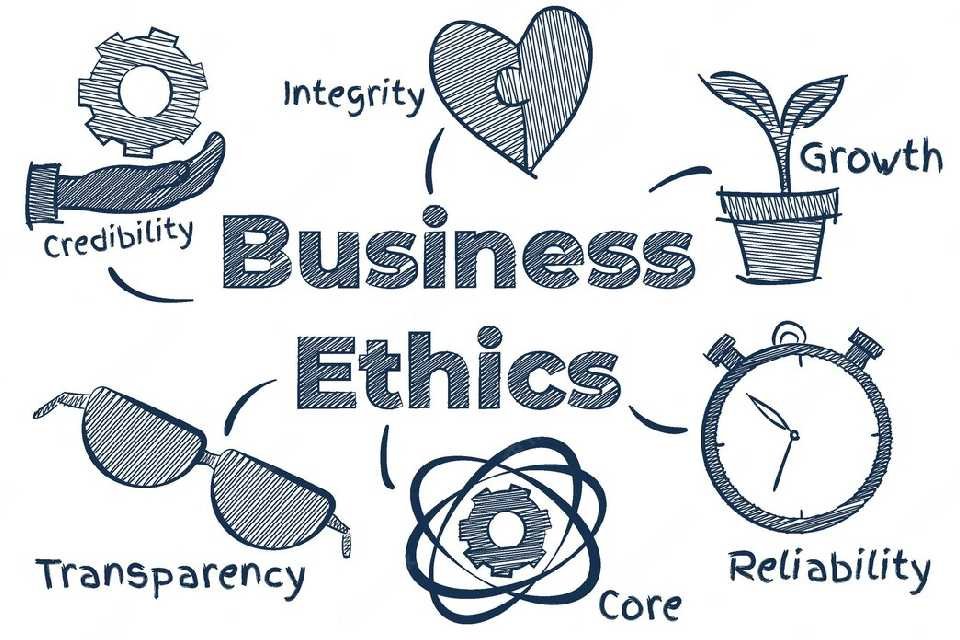
1. Corporate social responsibility
Corporate social responsibility (CSR) is the idea of addressing the requirements of partners while representing the effect addressing those necessities has on representatives, the climate, society, and the local area wherein the business works.
Obviously, funds and benefits are significant, yet they ought to be optional to the government assistance of society, clients, and workers — on the grounds that reviews have inferred that corporate administration and moral practices increment monetary execution.
Organizations ought to consider themselves responsible and answerable for their ecological, magnanimous, moral, and monetary effects.
2. Transparency and trustworthiness
It’s fundamental for organizations to guarantee they are detailing their monetary presentation in a manner that is straightforward. This applies to required monetary reports as well as all reports overall. For instance, numerous companies distribute yearly reports to their investors.
The majority of these reports frame the submitted reports to controllers, yet how and why choices were made, assuming objectives were met, and factors that affected presentation. Chiefs compose rundowns of the organization’s yearly presentation and give their viewpoints.
Public statements are another way organizations can be straightforward. Occasions essential to financial backers and clients ought to be distributed, whether or not it is positive or negative information.
3. Technological practices and ethics
The developing utilization of innovation of all structures in business tasks innately accompanies a requirement for a business to guarantee the innovation and data it accumulates is being utilized morally.
Also, it ought to guarantee that the innovation is gotten to the most extreme of its capacity, particularly as numerous organizations store client data and gather information that those with accursed goals can utilize.
4. Fairness
A working environment ought to be comprehensive, different, and fair for all representatives paying little heed to race, religion, convictions, age, or personality. A fair workplace is where everybody can develop, be advanced, and become effective in their own particular manner.
Examples of business ethics:
Business morals are displayed in various ways by various organizations. A few organizations show morals through their set of rules, while others are found in the business esteem explanation. Here are a few instances of business morals rehearses:
1. Diversity in the workplace
A business can show its unprejudiced view and drive for balance by utilizing laborers of various foundations, sexes, gatherings, and races. This likewise gives a variety of reasoning and a changed pool of information.
2. Prioritizing customer needs
One way organizations lay out trust and associations with clients is by focusing on clients’ requirements and offering the best administrations to them. This might be finished by, for instance, offering a trade or a discount for a flawed item bought by a client.
3. Customer data protection
During on the web exchanges or administrations, client data is typically gathered by organizations because of multiple factors. Among these could be private data, email address, street number, date of birth, monetary data, or wellbeing status, it being delivered to rely upon the administrations.
Business morals expects that this data be kept classified and not imparted to an outsider except if consent is conceded by the client. Information insurance likewise applies to a business’ representatives.
4. Community empowerment
Volunteer projects coordinated by organizations are an approach to rewarding the local area. These worker projects might incorporate abilities educating, monetary help, natural tidy up, and so on. Such projects assist organizations with acquiring regard from the local area and furthermore help community’s development.
5. Whistleblower protection
As a business develops, it becomes more enthusiastically to confirm that workers are keeping to the moral norms set by the organization. Some of the time the business will depend upon an informant to cause to notice untrustworthy practices inside the organization.
To urge representatives to approach to report untrustworthy practices, organizations will frequently set up securities against adverse results. With these insurances, workers don’t have to fear losing their positions or confronting disciplinary activity for bringing up exploitative way of behaving.
6. Corporate transparency
A business that rehearses straightforwardness will be clear in its correspondences both with representatives and to clients or clients. The language utilized will be unambiguous so there is no question about the approaches or needs that guide business choices.
Straightforward corporate interchanges will likewise tell the truth and honest. Everybody working for or drawing in with the organization ought to have the option to believe what it says.
7. Community outreach
Organizations frequently feel a moral commitment to reward the networks in which they carry on with work. This can appear as volunteer projects to which representatives are urged to give time, maybe even to the organization’s detriment.
Such projects could incorporate serving at a soup kitchen, assisting with home fixes, tidying up after a catastrophic event, or showing abilities at the nearby public venue. These projects help those out of luck, yet in addition assemble regard and trust inside the local area.
8. Environmental awareness
Many organizations treat worries for the climate in a serious way, whether eliminating waste or tidying up the land, water and air. There are different ways organizations follow up on this, for example, decreasing air travel and involving remotely coordinating innovation however much as could reasonably be expected.
Organizations could likewise advance reusing in their workplaces by giving containers to gather recyclable waste and setting up for them to be purged routinely.
9. Employee compensation
Organizations sticking to standards of reasonableness and regard will pay their representatives a fair compensation for the work they do in light of their experience, training and the idea of the work. They will likewise routinely survey worker remuneration and change it to ensure it keeps on being a fair portrayal of the representative’s situation and experience.
Organizations will frequently remunerate exceptional execution with representative rewards. These are a decent motivator for representatives to try sincerely and stay with the organization. They are likewise a way for the business to offer thanks for the representatives’ endeavors.
Elements of business ethics
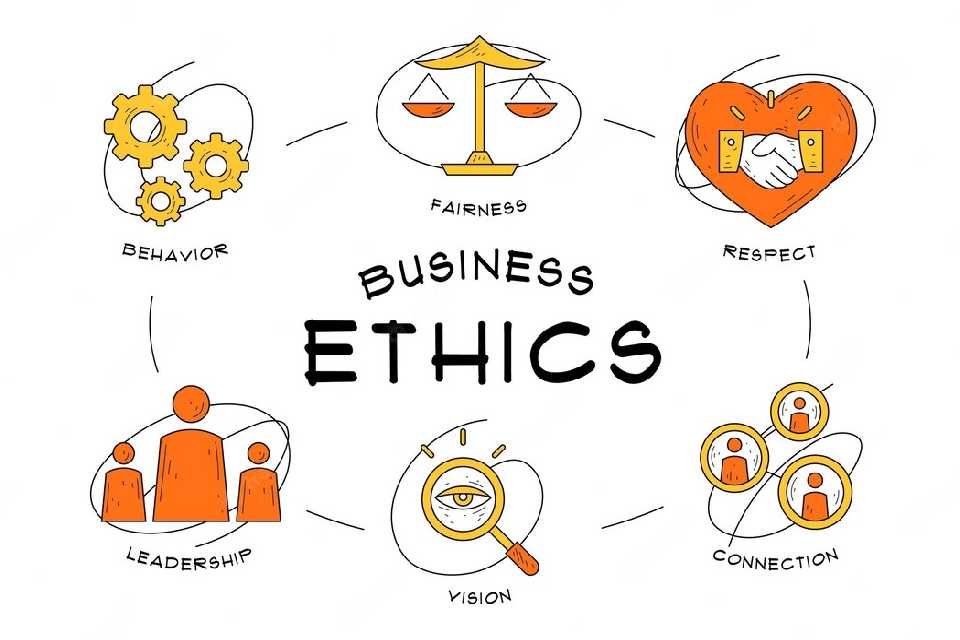
1. Top management commitment
The top administration of an association assumes a vital part in guaranteeing business morals. They guide the entire association towards moral way of behaving. To obtain improved results and teach moral way of behaving among the individuals from an association, the Chief and other high level supervisors need to invest in moral lead unequivocally.
Their obligation to the moral set of principles will set a genuine model for the workers and urge them to follow the actual codes. They should lead the representatives to keep on fostering the firm and maintain its qualities.
2. Publication of a code
Organizations having viable morals programs characterize the standards of direct written down for the entire association. This composed archive of standards of lead is known as “code.”
The code or set of rules covers different regions, similar to item quality, item security, key trustworthiness, adherence to regulations, monetary announcing, showcasing rehearses, business practices, well–being and well–being at work, and so on. These standards or norms guide an association and its activities.
3. Establishments of compliance mechanisms
Distributing the implicit set of rules isn’t adequate until the association lays out a component to guarantee they are being trailed by the workers and the activities of the firm conform to these principles.
For instance, guaranteeing the candidate has values and morals while selecting, shaping a correspondence framework for representatives to report any occurrence of deceptive way of behaving, and so on.
4. Involving employees at all levels
Representatives of an association assume a critical part in the execution of moral strategies at various levels of the business, making the possibility of moral business genuine. Subsequently, associations need to include representatives in morals programs.
For instance, an association can shape a little gathering of representatives to examine the fundamental morals strategies of the firm and assess the workers’ perspectives towards these strategies.
5. Measuring outcomes and results
It isn’t not difficult to quantify the aftereffects of a morals program with full precision. In this manner, the associations executing morals projects can check and review the final products and guarantee that the representatives complete the work as per moral norms.
When the examining has been finished, the high level administration and different workers of the firm can talk about the outcome for their further game-plan.
Benefits of ethics in business
The benefits of business ethics include:
1. Morals in business give upper hands to organizations, as clients and financial backers would prefer to connect with organizations that are straightforward.
2. Being consistent with set business morals works on a business’ picture, making it more appealing to ability, clients, and financial backers.
3. Morals in business assist with establishing a propelling workplace where representatives love to be, since their ethics are lined up with organization’s ethics.
However agreeing with moral practices is generally intentional, some moral strategic policies are compulsory, for example, submitting to law and order. Early consistence saves organizations from future legitimate activity, for example, enormous fines or business disappointment coming about because of resistance with rules and guidelines.
Drawbacks of ethics in business
The drawbacks of business ethics include:
Creating, carrying out, changing, and keeping up with morals in business takes time, particularly when a business is simply recuperating from a standing embarrassment because of unfortunate morals. Morals likewise should be consistently refreshed by organizations because of changes in business regulations and guidelines.
The conceivable compromise among morals and benefit is another issue. Morals in business can influence a business’ capacity to completely boost benefit creating open doors. For instance, a moral business with a creation manufacturing plant in an emerging nation wouldn’t attempt to reduce down on work expenses by deceptive means.
Such means could incorporate expanding benefits by paying low wages, or making representatives stay at work past 40 hours without pay. All things considered, a moral business would try to establish a sustaining workplace regardless of whether this prompts lower benefits.
How to implement good business ethics?
Cultivating a climate of moral way of behaving and dynamic takes time and exertion — it generally begins at the top. Most organizations need to make a general set of rules/morals, core values, detailing methodology, and preparing projects to uphold moral way of behaving.
Whenever direct is characterized and programs carried out, nonstop correspondence with representatives becomes indispensable. Pioneers ought to continually urge representatives to report concern conduct — moreover, there ought to be confirmations that in the event that informants won’t confront ill-disposed activities.
A pipeline for mysterious revealing can assist organizations with distinguishing sketchy practices and console workers that they won’t confront any ramifications for detailing an issue.
Monitoring and reporting unethical behavior:
While forestalling untrustworthy way of behaving and fixing its antagonistic aftereffects, organizations frequently shift focus over to chiefs and representatives to report any frequencies they notice or experience. Notwithstanding, hindrances inside the organization culture (like apprehension about counter for announcing unfortunate behavior) can keep this from occurring.
Distributed by the Ethnics and Compliance Initiative (ECI), the Worldwide Business ethics Study of 2021 reviewed north of 14,000 representatives in 10 nations about various kinds of wrongdoing they saw in the work environment.
49% of the workers over-viewed said they had noticed wrongdoing and 22% said they had noticed conduct they would arrange as oppressive. 86% of representatives said they revealed the unfortunate behavior they noticed. When addressed in the event that they had encountered reprisal for revealing, 79% said they had been fought back against.
To be sure, apprehension about reprisal is one of the essential reasons representatives refer to for not detailing deceptive conduct in the working environment. ECI says organizations ought to pursue working on their corporate culture by building up the possibility that announcing thought wrongdoing is advantageous to the organization. Moreover, they ought to recognize and remunerate the representative’s boldness in making the report.
How to monitor business ethics within an organization?
Checking morals inside an association implies laying out strategies, having an informant hotline, and keeping a hearty consistence program. Strategies like a set of principles or set of rules ought to be circulated and endorsed by all representatives (and outsiders that follow up for the association’s sake) to recognize that they know about the norms.
One more basic part of checking morals inside an association is an informant hotline where representatives can report potential bad behavior saw in the working environment. These reports give initiative an elevated perspective into the association and assist with uncovering how morals are truly being done everyday.
At last, having serious areas of strength for a program is the foundation of business morals. In addition to the fact that a powerful consistence programs fabricate a moral culture yet it likewise maintains a strategic distance from fines and exorbitant legitimate exercises for ways of behaving that might have been moderated.
Frequently Asked Questions (FAQ’s):
What is business ethics?
Business ethics concerns moral problems or disputable issues looked by an organization. Frequently, business ethics include an arrangement of practices and techniques that assist with building entrust with the shopper.
On one level, some business ethics are implanted in the law, for example, least wages, insider exchanging limitations, and ecological guidelines. On another, business ethics can be impacted by the executives conduct, with colossal impacts across the organization.
What are business ethics examples?
Examples of business ethics:
- Diversity in the workplace
- Prioritizing customer needs
- Customer data protection
- Community empowerment
What are business ethics and business examples?
Business ethics guide chiefs, directors, and representatives in their everyday activities and navigation. For instance, consider an organization that has chosen to dump substance squander that it can’t stand to discard appropriately on an empty parcel it has bought in the neighborhood local area. This activity has legitimate, natural, and social repercussions that can harm an organization hopeless.
What are the 7 business ethics?
Business ethics is an evolving topic. Generally, there are about 12 ethical principles: honesty, fairness, leadership, integrity, compassion, respect, responsibility, loyalty, law-abiding, transparency, and environmental concerns.
Why ethics in business is important?
The significance of business morals is obvious in business tasks. Business morals guide an association in these tasks and keep them in accordance with regulations and guidelines. This direction assists the business with keeping a positive public picture and notoriety of decency.
What are the forms of business ethics?
Different forms of business ethics are:
- Personal responsibility
- Corporate responsibility
- Social responsibility
- Technology ethics
- Trust and transparency
- Fairness
What are the business ethics principles?
There are seven principles of business ethics including accountability, care and respect, honesty, healthy competition, loyalty, transparency, and respect for the rule of law.
Conclusion
Business ethics concerns representatives, clients, society, the climate, investors, and partners. The term what is business stands for business ethics. Thus, every business ought to foster moral models and practices that guide workers in their activities and guarantee they focus on the interests and government assistance of those the organization serves.
Doing so not just expands incomes and benefits, it establishes a positive workplace and fabricates entrust with buyers and colleagues.
Ethics in business expects organizations to act such that partners think about fair and legit. These ethics additionally guide proprietors, administrators, and representatives in pursuing ethically fulfilling choices and building entrust with clients.



6 thoughts on “What is business ethics? | Business ethics definition, types, and examples – What matters business ethics?”